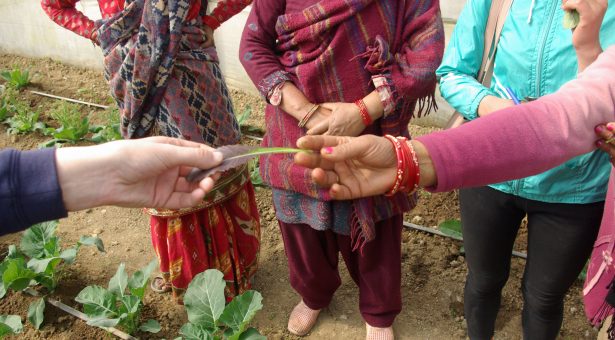
An ambitious international partnership will investigate the forests and farmlands of Nepal as a bio-diverse hotspot to inform global practices in combatting pathogens and pests.
The three-year project, starting on April 1, 2022, will bring together researchers interested in investigating how new aggressive forms of crop pathogens and pests arise and disperse in a changing climate. The aim is to facilitate new research activities that can improve agricultural resilience by farming in a way which uses fewer chemical inputs and produces lower carbon emissions.
Funded by a BBSRC International Partnering Award, the project will establish links between the Agriculture and Forestry University Nepal, the John Innes Centre, University of East Anglia (UEA), Norwich Institute for Sustainable Development (NSID), Rothamsted Research, Aarhus University, Denmark, and the Mexico-based agricultural research organisation CIMMYT.
The project, Nepal, Denmark, Mexico: Resilience to Crop Pests and Disease in a Changing Climate, will be delivered through online workshops, exchange visits, mini symposia and by defining future collaborative research projects.
Dr Diane Saunders from the John Innes Centre said: 'Nepal has a great diversity of habitats and climate, and this new award is a fantastic opportunity to develop our scientific understanding of how pests and diseases evolve in a changing climate. It also provides an excellent opportunity to strengthen our links with Nepal and fits well with the planned expansion of our MARPLE diagnostics project."
Agriculture is under threat from new aggressive variants of pests and pathogens emerging from spontaneous adaptation to susceptible crops – and their subsequent distribution around the world.
While new variants can arise anywhere, there are key hotspots where genetic diversity accelerates adaptation to crops. Climate change also affects pests and pathogens, facilitating their spread to new areas.
Nepal is extremely vulnerable to climate change impact. The country is also a hotspot of genetic diversity due to a multitude of niche habitats and alternate hosts for pests and pathogens.
Dr Chris Ridout from the John Innes Centre said: 'We have been working with the Nepal researchers for several years. This new award is a fantastic opportunity to build our collaboration and widen the international community of researchers working with Nepal."
The specific objectives of the project are:
- Gaining insight into the evolution and pathogen diversity in yellow rust, a serious pathogen of wheat.
- Improving understanding of why cabbage stem flea beetle has become an important pest of Brassica crops, to identify new sources of resistance and develop pest management strategies.
- Enhancing understanding of agricultural resilience to improve the uptake of new crop varieties and reduce carbon emissions.
Professor Shiva Chandra of the Agriculture and Forestry University, Nepal, said: "This project will help students and faculty researchers at Agriculture and Forestry University to increase their capacity on understanding the evolution and pathogen diversity in wheat yellow rust, and other important pests of wheat and other allied crops through field trials, socio-economic research and exposure visits. It will help to increase the area, production, productivity and farmers' income from major winter season crops through study outputs on better seed supply systems and disease-pest control."
Professor Arjan Vershoor of the UEA said: "The proposal will strengthen a partnership between the John Innes Centre and the University of East Anglia embarked on through the Norwich Institute for Sustainable Development. The NISD aims to further climate-resilient agriculture, including in Nepal, through a combination of improved cultivars and financial support mechanisms. The partnering award will be a crucial step in that direction."
Professor Melanie Welham, Executive Chair at BBSRC, said: "BBSRC's International Partnering Awards provide a unique opportunity for UK researchers to collaborate with their international partners on vital programmes of work.
"This new and exciting partnership will not only foster crucial relationships, it will also enable the sharing of key research expertise in support of tackling sustainable development goals."
About the BBSRC International Partnering Award Scheme
BBSRC's International Partnering Awards provide resources to leading BBSRC-supported research groups.
They enable groups to forge long-term relationships with international researchers and technical specialists in areas of research that are of direct relevance to BBSRC's current research and innovation strategy.
The purpose of the awards is to provide 'pump-priming' funds for building new links with overseas researchers and technical specialists that add value to existing BBSRC funded research grants.






